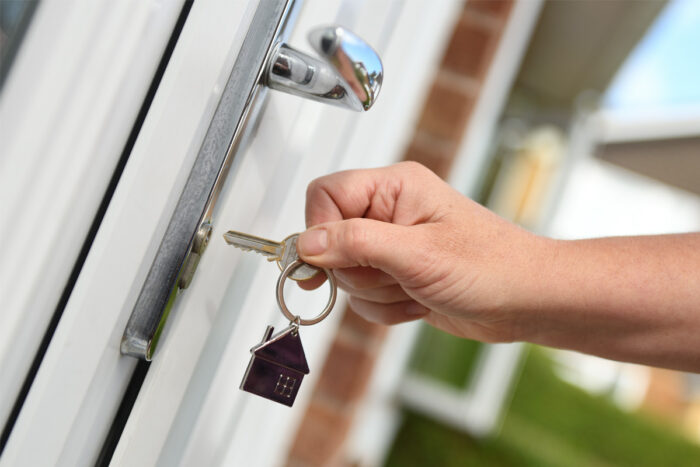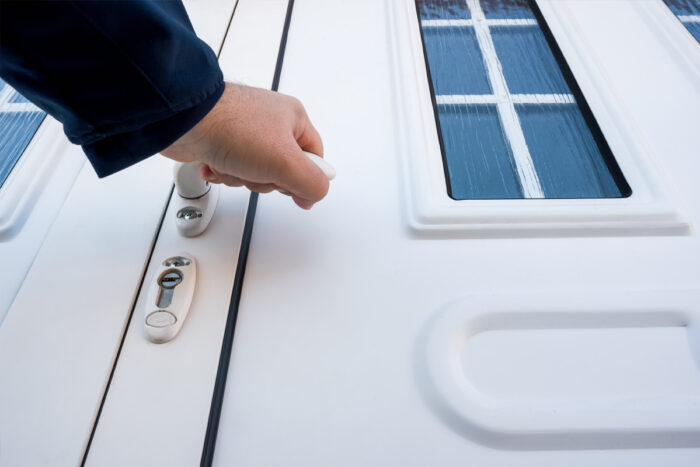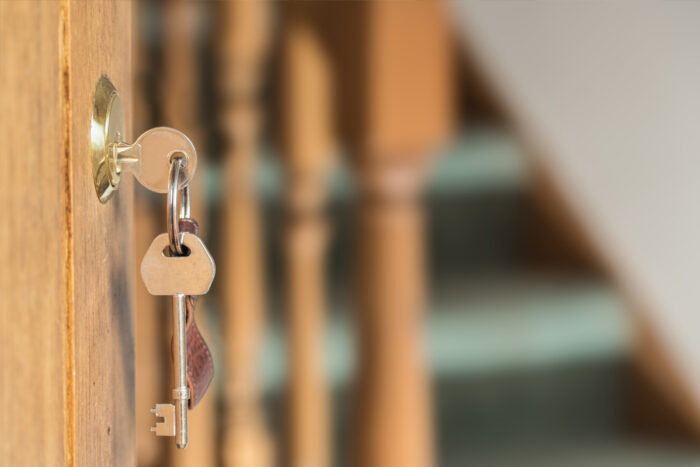Expert advice on which door locks are suitable for which type of door
An external door generally serves two main purposes; aesthetically it creates a striking feature to your home but more importantly it also protects your home from the elements and any intruders. This means that choosing the right external doors for your home is critical and there are number of different factors to consider including durability, security as well as style.
In this post we guide you through the three main types of external doors available and weigh up the practical benefits each one brings, as well as offering expert advice on which door locks are suitable for each type of door.
Composite doors & their locks

When it comes to door materials, composite doors are often labelled “the very best of”, this is due to the combination of different materials that make them. They’re generally made from materials including wood, PVC, insulating foam and glass reinforced plastic. This composite of materials means they have very very few flaws compared to other materials and boast a huge range of benefits. Composite doors are 44mm in thickness across the whole door compared to uPVC doors within which the centre panels are only 28mm. A quality composite door is made from superior materials which makes them strong, secure, durable and weather resistant.
Composite door benefits
Composite doors boast a high-quality wood grain effect that gives a natural finish similar to that of wood. In terms of visual design, there is a huge choice of styles available. Glazed panels are popular in composite door designs, these add an attractive feature to the door without compromising on strength.
One of the main benefits of composite doors has to be their security options. A lot thicker than uPVC, a composite door often features steel reinforcements and tough frames, making them almost impossible to break once installed correctly. They are incredible robustness makes them a great choice for your home.
Another main advantage of composite doors is their fuss free maintenance. They don’t absorb moisture which means they won’t warp or fade over time as well as allowing them to withstand a wide range of elements. A composite door can stand strong for up to 35 years with very little maintenance at all.
Best locks for composite doors
Many composite doors nowadays are commonly specified with high security door locks. If your composite door has been tested to PAS 24 and carries a Secure by Design certificate, this means the lock supplied has already been tested to an extremely high level of attack so a new lock will not be needed.
If the door is untested then you have two options for your door locks. A standard euro cylinder door lock will fit most composite doors and provide a good level of security. You can also choose to install a 3-star euro cylinder lock; brands such as Ultion provide high security 3-cylinder locks that prevent against lock picking, snapping, drilling and more. Both of these locks, particularly the Ultion door lock, will help prevent your property from being broken into and any intruders gaining access via the door.
uPVC doors & their locks

uPVC stands for un-plasticised polyvinyl chloride. uPVC doors are made purely with plastic and generally it is a stable and safe plastic material. uPVC has become a very popular building material for exterior doors in the last 50 years due to its water-resistance and recyclable nature. uPVC doors were generally a preferred choice due to their affordability, attractive appearance and easy-cleaning.
uPVC door benefits
One of the main benefits to a uPVC door is the cost, making them much more affordable for many homeowners. They are much cheaper to manufacture than wood or composite doors helping to keep the price relatively low. They boast better security benefits than a traditional wooden door as they can’t split which provides reasonable durability. Modern uPVC doors have galvanised steel cores which are very difficult to break, meaning your home will be more secure against intruders.
Generally, uPVC doors are supplied in white however there are exterior door paints available nowadays which allow customers to rejuvenate their door & create a stylish appearance. uPVC doors are easy to maintain and clean, however if uPVC doors are not maintained and serviced the life span is possibly only 10 years but can last 30 years plus with correct service and care.
Best locks for uPVC doors
You will usually find a multipoint lock with a euro cylinder on most uPVC doors. Although euro cylinder locks do work on uPVC doors, they are prone to lock snapping making your property extremely vulnerable. If you’re looking for an additional level of security, we recommend the use of a 3-star euro cylinder lock. These can be successfully fitted to most uPVC doors and boast a huge range of benefits; the 3-star security rating provides maximum security from all known methods of forced entry, including cylinder snapping manipulation, picking and lock bumping.
Wooden doors & their locks

A standard hardwood external door is generally made with a single solid core, possibly with a wooden veneer over-lay. Unlike composite doors wooden doors are not made up of mixed materials; a customer favourite tends to be hardwood as it offers a solid, robust feel. As a natural and extremely versatile building material, wooden doors come in a far wider range of designs than uPVC doors. Wooden doors have been around for years therefore offering a classic, charming design that will never date.
Wooden doors are a very popular choice offering a great choice of style, price points and design options. A solid timber door will cost you much more than a uPVC door, however does lack some of the benefits of a composite door.
Wooden door benefits
Home owner often opt for a wooden door due to their ability to be easily painted, this means you can easily refresh the look of your home, keeping up with changing interior trends. The craftsmanship and skill of wooden doors is clearly visible, this adds to their overall appeal and charm. Timber doors offer a traditional feel that would work great in any countryside setting, or in a modern environment to add charm.
Another flexibility of wooden doors is size and their ability to easily work with. If necessary, the door can be repaired, as wood is easy to work with this means if you damage the door, you may not have the high cost of replacing it.
Wood is also great at retaining heat, therefore improving your homes thermal efficiency. The properties of the material mean that warmth is retained inside, and any noise disturbances are kept out.
Best locks for wooden doors
A wooden door may require a different type of lock compared to uPVC or Composite doors; this is because many wooden doors actually have two locks fitted. It is extremely important that any lock fitted meets the requirement of BS3621; this is a lock standard by British Standards Institute (BSI) for thief-resistant locks.
An exterior wooden door is most suited to a British standard mortice, or a mortice dead-lock. It is advised that wooden doors have two locks installed in order to fully protect against a brute force attack. For example, a rim cylinder alone is not ample for a wooden door and should be fitted alongside a dead-latch.
Other types of doors
There are many other types of doors including patio, bi-fold, sliding doors, French doors and more. Most of these doors are made from a range of materials mentioned in this post therefore will have similar advantages and disadvantages.
Speak to a professional locksmith
When it comes to selecting a door lock for your door it’s always best to speak to a professional such as SF Locksmiths. We offer a free security audit; this will include evaluating the type of door you currently have and advising the most suitable lock type for that particular door material. To book an appointment call Stephen on 07990 573 857 today.